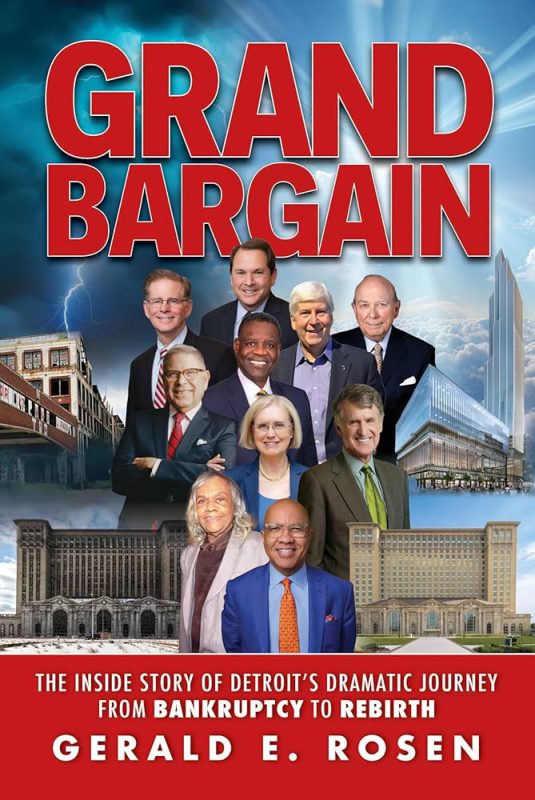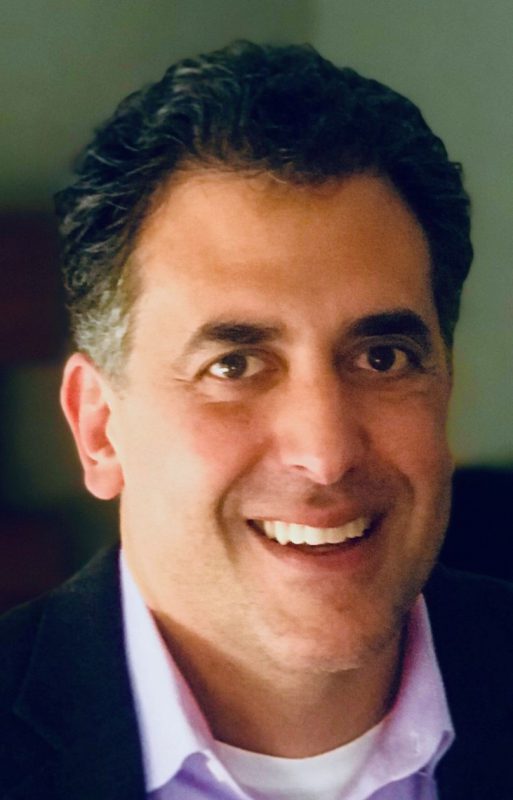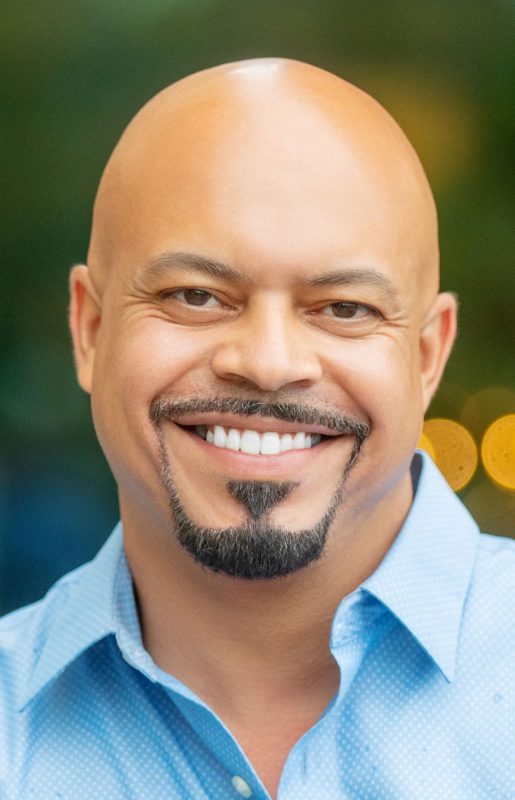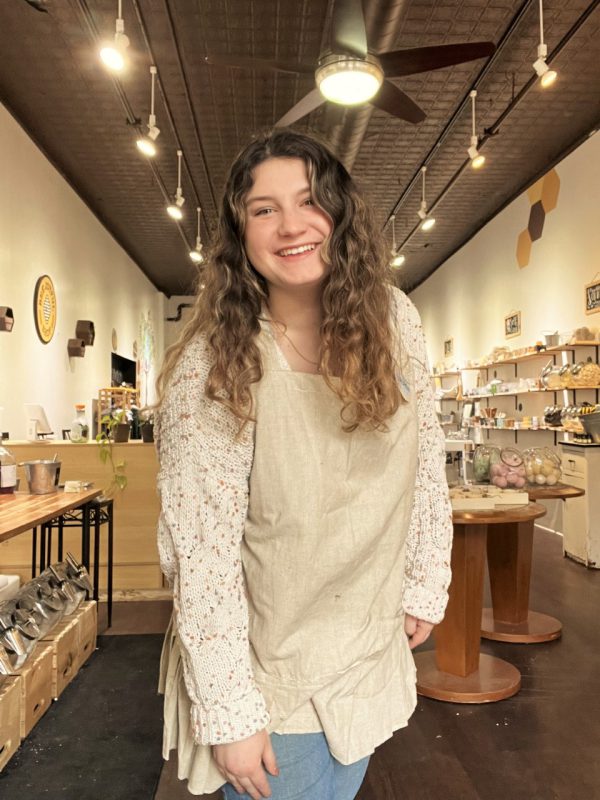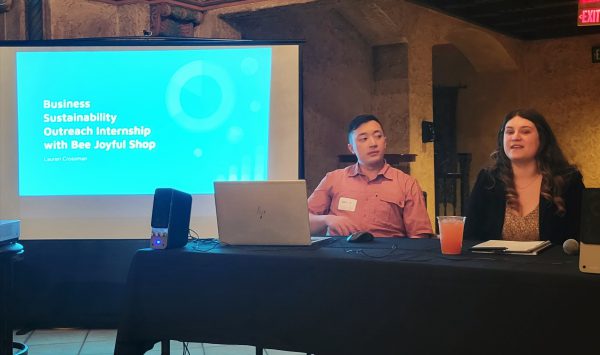City businesses and officials are taking note of a Kalamazoo College student’s Senior Integrated Project (SIP), which quickly has made her a recognizable local voice in sustainability.
Since 2021, Lauren Crossman ’23, a political science major, has worked at Bee Joyful Shop, a store on Kalamazoo’s downtown walking mall that features locally made, zero-waste products for homes, kitchens, baths and beauty routines. She got the job after interviewing women who opened businesses during the pandemic for a journalism class, including the owners of Mason Jar Plant Shop, Colors and Cocktails, Kalamazoo Fashion House and Bee Joyful.
Through Bee Joyful, Crossman developed a passion for sustainability; however, by the time she realized that interest exceeded her love of political science, it seemed too late to change her major or add an environmental studies concentration. That’s when Jeanne Hess—a Bee Joyful customer and city commissioner who retired in 2019 from K as a physical education professor and volleyball coach—planted an interesting idea. She suggested that Crossman create her own internship based on sustainability at Bee Joyful, an idea that also provided a formative plan for Crossman’s SIP.
Bee Joyful owner Jessica Thompson provided enthusiastic approvals and a few ideas on how that internship would work.
“Jessica said she had actually been thinking about creating a week of sustainability events, or I could go talk to other businesses on the mall and see if we can get them to be more on board with different ways to reduce waste and make them all greener,” Crossman said.
Crossman started the internship by researching environmentally friendly business practices involving ideas from cocktail straws to packaging materials. All of it had the potential to help businesses reduce waste and save money. Yet then came the tough part: Crossman began to cold call and visit 22 small businesses in Kalamazoo to discuss their environmental practices, present an environmental report card, and help them create sustainability-related goals.
“It was something that was way outside of my comfort zone,” Crossman said. “I remember talking to my family and friends and saying, ‘I don’t know how I’m going to do this.’ I had this feeling that no one was going to take me seriously because they didn’t know me. I was this random student from K College who wanted to talk about the environment.”
Regardless, Crossman pursued the work and said the conversations generally went well.
“A lot of those businesses at first said, ‘I’m just trying to keep the lights on and pay the bills,’ so there were uncomfortable points,” she said. “Others thought it was a nice conversation to have, but it might not make a difference. But I was surprised at how many of the business owners appreciated just starting the conversation.”
As those conversations developed, business owners began to see that even small gestures could make big differences as Crossman provided resource guides, viewable through the Instagram profile link @sustainable.kzoo.businesses, that were specific to retail stores, restaurants, salons, brick-and-mortar locations and online businesses.
“I was trying to highlight that there are so many ways businesses can be sustainable, in big ways or small ways, down to the type of tape they use to ship out boxes,” Crossman said. “It all can make a difference. I brought all those guides with me to each of the businesses and shared that information, and we worked through the eco report cards that had around 20 business practices. I got down to fine details like having LED lights or asking vendors to ship products without plastic, so they could see a wide variety of what they could do.
“The eco report cards were helpful because businesses could use them as a starting point to say, ‘we’re doing a lot of really good things, and there are ways we can improve,’” she added. “I feel putting that information together grounded me so I could go in and talk to the business owners.”
With happy business owners starting to save money and be more sustainable, Crossman presented her work at the Kalamazoo State Theatre in March during Green Drinks Kalamazoo, a monthly networking event of city businesses and friends that addresses sustainability. At the event, Professor of History Charlene Boyer Lewis, serving as Crossman’s SIP advisor, spoke up to let Crossman and the crowd know that Crossman had earned honors on her SIP. And next, Crossman plans to offer her report to Hess, who regularly attends the city’s environmental concerns committee, to ask for her opinions.
“We have opportunities in Kalamazoo that aren’t being seized and I think there’s so much potential for impact and people are already willing to make changes,” Crossman said. “But nobody’s holding them accountable. I think that was the biggest part of the critique. I think it’s important information for somebody to see, because the businesses are willing to make changes, but what’s the city’s role now and what are they doing, too?”
In the meantime, Crossman can provide a sustainability leader’s view of Earth Day, celebrated every April 22, the anniversary of the birth of the modern environmental movement in 1970.
“I feel like there’s a lot of good that can be done on Earth Day, but we can’t forget about the rest of the days of the year,” Crossman said. “I don’t want people to think that if they say no to a straw one day of the year that they’re doing enough. Helping the environment needs to be a lifestyle change. We can’t just talk about climate change one day of the year. It must be a pressing conversation all the time, because it’s a pressing problem all the time.”
